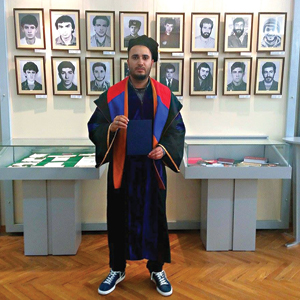An estimated 20,000 predominantly Christian Syrian Armenians have sought refuge in their Armenian motherland to escape the five-year civil war. This number makes Armenia, with its population of 3 million per capita, the third largest host nation of Syrian refugees. However, the reception for the Syrians in Armenia is mixed.
Sarkiss Rshdouni, 28, from Aleppo, can trace his family’s roots back to a third-century Armenian dynasty. He came to Yerevan, Armenia’s capital, in 2012, to flee the war and to study Armenian history with the hope of working as a tour guide.
Four years later, he is despondent. He says he is often asked if he is Muslim and why he even speaks Armenian since he is from Syria. Another problem is that he is paid less than a local person with the same experience and qualifications when he does get work as a tour guide.
Before the crisis, there were around 100,000 Armenians in Syria. Rshdouni explains that in Aleppo, with many descendants of victims of the 1915 genocide carried out by the Ottoman Turks, the community was extremely tight-knit. “We grew up talking about Armenia, dreaming about our homeland, we always wondered what it was like.” And for many, coming “home” for the first time as refugees, has been a shock.
Hranush Hakobyan, Minister of Diaspora, says the UN considers Armenia “one of the best examples of a host country for refugees”, but one of the problems is that life in vibrant Syrian cities such as Aleppo and Damascus was good, with high salaries compared to local salaries in Armenia. So coming to a post-Soviet country with an estimated 17 per cent unemployment rate was always going to be extremely difficult. But Ms Hakobyan was determined to integrate Syrians from the start. “We could have built camps like Europe, but we didn’t,” she says. “We wanted to welcome them as citizens, we are doing all we can to solve their problems.” Practically, this includes amending legislation to support new Syrian Armenian arrivals. For example, before the crisis, the waiting period for Armenian citizenship was 10 months. Now Syrian Armenians living in Syria can apply for their passport there, it is free, and the waiting time has been cut to three months.
Other measures include free healthcare, training in Armenia’s commercial rules and regulations, Russian classes and low-interest loans of up to US$20,000 to start small businesses. Ms Hakobyan says around 100 new businesses, including many restaurants, have started in this way. And indeed all over Yerevan there are Syrian restaurants, small spice shops and tailors who bring Arab-influenced flair to the post-Soviet city.
Anahit Hayrapetyan from the Armenian Office of the United Nations High Commissioner for Refugees (UNHCR) says: “It hurts me to think Syrian Armenians do not feel welcome because ... I see friendship … and we think of them as our ‘permanent guests’.” But, she adds, there is some misplaced resentment from local people. “I do see some jealousy, especially from older people who remember the really hard times”.
However, in Ms Hayrapetyan’s view, the main obstacle to integration, is the need for Syrian Armenians to make peace with the fact that they aren’t going to be able to go home any time soon.
28 July 2016, The Tablet
Yerevan battles to accommodate its ‘lost family’
 Loading ...
Loading ...
Get Instant Access
Subscribe to The Tablet for just £7.99
Subscribe today to take advantage of our introductory offers and enjoy 30 days' access for just £7.99



